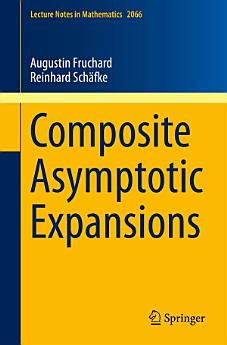Composite Asymptotic Expansions
Augustin Fruchard · Reinhard Schafke
ডিচে ২০১২ · Springer
ইবুক
161
পৃষ্ঠা
reportমূল্যাংকন আৰু পৰ্যালোচনা সত্যাপন কৰা হোৱা নাই অধিক জানক
এই ইবুকখনৰ বিষয়ে
The purpose of these lecture notes is to develop a theory of asymptotic expansions for functions involving two variables, while at the same time using functions involving one variable and functions of the quotient of these two variables. Such composite asymptotic expansions (CAsEs) are particularly well-suited to describing solutions of singularly perturbed ordinary differential equations near turning points. CAsEs imply inner and outer expansions near turning points. Thus our approach is closely related to the method of matched asymptotic expansions. CAsEs offer two unique advantages, however. First, they provide uniform expansions near a turning point and away from it. Second, a Gevrey version of CAsEs is available and detailed in the lecture notes. Three problems are presented in which CAsEs are useful. The first application concerns canard solutions near a multiple turning point. The second application concerns so-called non-smooth or angular canard solutions. Finally an Ackerberg-O’Malley resonance problem is solved.
এই ইবুকখনক মূল্যাংকন কৰক
আমাক আপোনাৰ মতামত জনাওক।
পঢ়াৰ নির্দেশাৱলী
স্মাৰ্টফ’ন আৰু টেবলেট
Android আৰু iPad/iPhoneৰ বাবে Google Play Books এপটো ইনষ্টল কৰক। ই স্বয়ংক্রিয়ভাৱে আপোনাৰ একাউণ্টৰ সৈতে ছিংক হয় আৰু আপুনি য'তে নাথাকক ত'তেই কোনো অডিঅ'বুক অনলাইন বা অফলাইনত শুনিবলৈ সুবিধা দিয়ে।
লেপটপ আৰু কম্পিউটাৰ
আপুনি কম্পিউটাৰৰ ৱেব ব্রাউজাৰ ব্যৱহাৰ কৰি Google Playত কিনা অডিঅ'বুকসমূহ শুনিব পাৰে।
ই-ৰীডাৰ আৰু অন্য ডিভাইচ
Kobo eReadersৰ দৰে ই-চিয়াঁহীৰ ডিভাইচসমূহত পঢ়িবলৈ, আপুনি এটা ফাইল ডাউনল’ড কৰি সেইটো আপোনাৰ ডিভাইচলৈ স্থানান্তৰণ কৰিব লাগিব। সমৰ্থিত ই-ৰিডাৰলৈ ফাইলটো কেনেকৈ স্থানান্তৰ কৰিব জানিবলৈ সহায় কেন্দ্ৰত থকা সবিশেষ নিৰ্দেশাৱলী চাওক।




